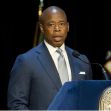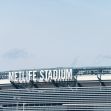The city that never sleeps is overwhelmed with traffic. Last week, the US Department of Transportation (DOT) approved a New York City plan to make toll drivers pay higher prices due to congestion and its effect on air pollution. New Jersey, with 400,000 daily commuters driving into the packed Manhattan streets, disagreed and filed a lawsuit in federal court on Friday against the surge pricing.
This congestion program is the first of its kind in the United States. The new NYC congestion plan received final approval from the Federal Highway Administration (FHWA), which also reported that the plan would have no impact on the local environment.
Currently, driving into Manhattan from New Jersey costs $15, no matter the day or time. Under the new plan, if streets are congested, New York City can charge toll drivers accessing Manhattan below 60th Street up to $23. The congestion pricing would impact drivers taking the Lincoln or Holland Tunnel into Manhattan, but not the George Washington Bridge toll drivers, who enter the city well above 60th Street.
The new plan was created to lower carbon emissions from vehicles entering New York City, improve public transit by encouraging more drivers to take buses or trains into Manhattan, and improve the city residents' quality of life.
New Jersey Governor Phil Murphy said the plan is unfair to the Garden State, and that they will fight “tooth and nail” to overturn the congestion plan.
“We’ll bear the burdens of congestion pricing while New York City gets the benefits, and that’s not fair,” said Governor Murphy, at a press conference. following the suit.
In course papers, New Jersey argues that the DOT approval of the new plan is, in part, “misguided.” The court documents allege the new congestion plan violates a 1970 law created to safeguard the environment.
The National Environmental Policy Act (NEPA) mandates all US agencies consider the environmental impact of any major federal project, including traffic congestion and any city plan that uses federal funds. Under NEPA, US agencies must conduct an assessment and consider public comments about any such project.
The Act was designed to protect the local environment by requiring numerous federal agencies to review any major projects that might negatively impact the environment.
Legal documents filed by New Jersey said that federal approval was “misguided” and violates the National Environmental Policy Act. In court papers, New Jersey argues that the state will carry the burden of congestion pricing on its daily 400,000 toll drivers, but not receive any of the benefits of the program. “New Jersey will bear much of the burden of this congestion pricing scheme—in terms of environmental, financial, and human impacts—but receive none of its benefits,” the lawsuit said.
The lawsuit asked the court to place all New York City traffic congestion pricing on hold. The suit asked for traffic and environmental studies to be conducted to study the impact on heavy New York City traffic and air quality, which would take years to complete.
The new congestion plan is expected to dramatically reduce the number of all vehicles, including cars and trucks, that enter New York City below 60th Street by 10% daily.
Midtown and downtown Manhattan are reported to have the worst gridlock in all of the country. On average, cars and trucks in midtown and downtown Manhattan are reported to travel about seven miles per hour, although this reporter has experienced more than a dozen instances of spending two hours in midtown or downtown traffic just to travel about twelve blocks in total.
Times to enter or leave New York City by car at the Lincoln or Holland Tunnel can take anywhere from ten minutes to two hours, depending upon the time of day and traffic congestion.
The NYC Metropolitan Transportation Authority (MTA) would receive the congestion plan funds. The MTA said the plan would strengthen and promote public transit from neighboring states into the city.
Every weekday, those 400,000 New Jersey toll drivers entering the city below 60th Street bring in about $6 million. With the new congestion price, the funds coming in from toll drivers would, on a busy day at $23 per car, rise to $9,200,000.
Due to the high cost and traffic concerns, over 895,000 New Jersey commuters already travel via 12 commuter rail lines, 240 bus lines, and three light rail systems. New Jersey Transit is the largest state public transportation system in the United States.
In total, more than 1.6 million people commute to NYC daily, from multiple states, via vehicles or public mass transit.






